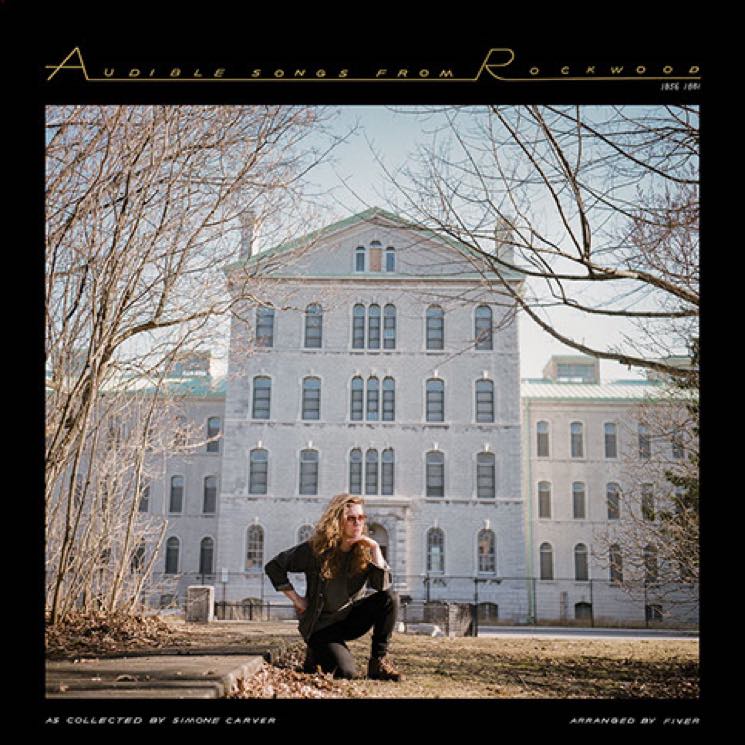Audible Songs From Rockwood is an important, passionately inventive work of historical fiction/folk music by Fiver (one of a few names employed by the Highest Order's Simone Schmidt). Deeply researched, it un-silences the voices of women incarcerated at the Rockwood Asylum for the Criminally Insane in Kingston, ON between 1856 and 1881 for failing to conform in a variety of ways in the mainstream society of the day: freedom of sexuality, desire to own property, epilepsy, or going crazy railing against the injustices of colonialism, the patriarchy, servitude, etc. In one heartbreaking case, "House of Lost Words," a woman is stuck there for life simply because of her husband's failure to come and release her.
Looked at from the other way around — past to present — Rockwood reads like a work of science fiction. Schmidt (under the alias Simone Carver) aka the "song collector" spent a few years scouring the Ontario Archives for patient files, superintendent diaries, registers and supporting documents (essentially getting a crash course in archival science) to create these songs from the margins of the information available. "Retroactive reconstruction," she calls it in the liner notes. "Born of the limitations of time and space."
The fact that the resulting package of faux field recordings — the 30-page book of lyrics, illustrations, background history and references, in addition to a very fine record of old-time informed folk songs, is an homage to Smithsonian Folkways-style recordings — never reads as pretentious or contrived is a feat in itself. Carver/Schmidt achieves that a few ways: the songs have a sense of melodic immediacy and urgency that leaves their mystery and ambiguity intact (Schmidt wisely saves the more heavy-handed political spelling out for the liner notes); and the project continually points to its own limitations — there's a built in questioning of all authority, including the author's.
The other story that Audible Songs tells is a musical one; it's the fruit of Schmidt's successful apprenticeship in bluegrass and old-time folk music under Chris Coole, who, along with the Lonesome Ace Stringband, lends a hand. Other guests include Blood Ceremony's Alia O'Brien on airy, free flute on "Worship the Sun (Not the Golden Boy)," written from the perspective of a former member of the Brooks Bush Gang, and Kristine Schmitt, whose high lonesome voice joins Schmidt's arrestingly austere one on "Haldimand County" and "Carry on Warm"; the latter sounds a little like "Groundhog."
Audible Songs is an immersive experience: it takes time to pour over, to sink and settle in. It's an LP and coffee table book that eschews flawlessness and perfection — there's errata and redaction built in; it's a beautiful project about human ugliness, misunderstanding, suffering and injustice. Taking it in from the comforts of home, you can't help but reflect on its inherent uncomfortableness; the fact that these women were not granted the right to live freely in a manner of their choosing. It begs the question: how far have we come? How different or similar are we now?
Though often familiar in form, these songs are supposed to be unsettling and unsettled. Ultimately Audible Songs uses the story of Rockwood to pry open a broader story: one about the myths of the pioneer experience in Canada and the lingering effects of colonialism, capitalism, sexism, ablism and broken treaties on us now.
(Idée Fixe Records)Looked at from the other way around — past to present — Rockwood reads like a work of science fiction. Schmidt (under the alias Simone Carver) aka the "song collector" spent a few years scouring the Ontario Archives for patient files, superintendent diaries, registers and supporting documents (essentially getting a crash course in archival science) to create these songs from the margins of the information available. "Retroactive reconstruction," she calls it in the liner notes. "Born of the limitations of time and space."
The fact that the resulting package of faux field recordings — the 30-page book of lyrics, illustrations, background history and references, in addition to a very fine record of old-time informed folk songs, is an homage to Smithsonian Folkways-style recordings — never reads as pretentious or contrived is a feat in itself. Carver/Schmidt achieves that a few ways: the songs have a sense of melodic immediacy and urgency that leaves their mystery and ambiguity intact (Schmidt wisely saves the more heavy-handed political spelling out for the liner notes); and the project continually points to its own limitations — there's a built in questioning of all authority, including the author's.
The other story that Audible Songs tells is a musical one; it's the fruit of Schmidt's successful apprenticeship in bluegrass and old-time folk music under Chris Coole, who, along with the Lonesome Ace Stringband, lends a hand. Other guests include Blood Ceremony's Alia O'Brien on airy, free flute on "Worship the Sun (Not the Golden Boy)," written from the perspective of a former member of the Brooks Bush Gang, and Kristine Schmitt, whose high lonesome voice joins Schmidt's arrestingly austere one on "Haldimand County" and "Carry on Warm"; the latter sounds a little like "Groundhog."
Audible Songs is an immersive experience: it takes time to pour over, to sink and settle in. It's an LP and coffee table book that eschews flawlessness and perfection — there's errata and redaction built in; it's a beautiful project about human ugliness, misunderstanding, suffering and injustice. Taking it in from the comforts of home, you can't help but reflect on its inherent uncomfortableness; the fact that these women were not granted the right to live freely in a manner of their choosing. It begs the question: how far have we come? How different or similar are we now?
Though often familiar in form, these songs are supposed to be unsettling and unsettled. Ultimately Audible Songs uses the story of Rockwood to pry open a broader story: one about the myths of the pioneer experience in Canada and the lingering effects of colonialism, capitalism, sexism, ablism and broken treaties on us now.
